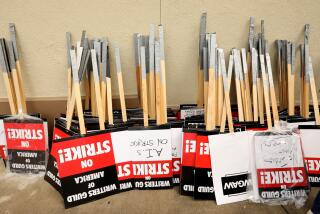Distribution deal gets books moving
- Share via
After a shake-up involving the sudden bankruptcy of book distributor Publishers Group West -- and worries that their own finances and stock would be tangled for months to come -- independent publishers are guardedly optimistic about a new distribution arrangement worked out last week in a Delaware courtroom.
“There’s a lot of work to do as to how it plays out,” said Charlie Winton, who helped found PGW, sold it five years ago, and now runs the publisher Avalon, which relied on PGW for distribution. “It’s the best possible situation. Compared to sitting in bankruptcy court, this is great. And that all of this can be settled in less than 60 days is nothing short of miraculous.”
The settlement means that more than 100 of PGW’s client publishers, who have received only minimal revenue for their sales from the fourth quarter of 2006, will be paid 70 cents on the dollar by Perseus Books Group. Perseus will take over their distribution contracts, and the publishers have agreed to extend their existing contracts by four years.
“It’s good news in that we now have a program in place that should be seamless, from the viewpoint of the consumer,” said Richard Nash, publisher of Brooklyn’s Soft Skull Press. “It will take an enormous amount of work behind the scenes to manage it, but the consumer will be unaware that any of this drama happened.”
The most important thing now, Nash said, is to retain as much of PGW’s existing staff as possible in the transition. “They know how to represent lots of idiosyncratic books to retailers. They know their individual publisher’s quirky habits really well, and are good at communicating to retailers the markets for the books they’re representing, which sometimes isn’t obvious.”
Nash added that his publisher, as well as Grove/Atlantic, Milkweed Editions, Black Classics and other PGW client publishers could benefit from Perseus’ long-standing connection to university markets.
“It’s nice to have this done with,” said Eli Horowitz, publisher of San Francisco-based McSweeney’s.
The bankruptcy put his press in an especially tough position: A portion of the revenue for Dave Eggers’ book about the “lost boys” of Sudan, “What Is the What?,” was intended to be donated to a foundation for Sudanese refugees. But PGW’s troubles meant that McSweeney’s collected almost nothing for the books sales, and was not able to assist the foundation either.
The case’s resolution brings some good news: Perseus has agreed to donate the full portion -- almost $80,000. “That makes a big difference, actually and symbolically,” said Horowitz. “It tells me a lot about what kind of company they wanted to be.”
PGW, which Winton co-founded in 1976, thrived until a long-brewing corporate scandal led its owner, Advanced Marketing Services, into declaring Chapter 11 at the end of December. Publishers will be paid when the sale closes, expected sometime next month. In a statement, Perseus Chief Executive David Steinberger said: “We are excited to move forward as quickly as possible to write checks to PGW clients and to provide some certainty for PGW employees.”
More to Read
Sign up for our Book Club newsletter
Get the latest news, events and more from the Los Angeles Times Book Club, and help us get L.A. reading and talking.
You may occasionally receive promotional content from the Los Angeles Times.










